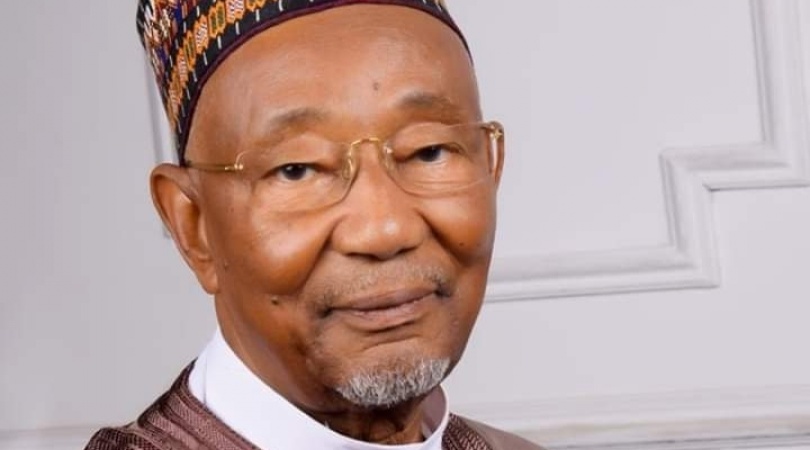“Is someone dying?” he asked. “I thought someone was dying because I have spare lives in my library or trunk so I could fetch one for him.”
The speaker was Senator Adamu Bulkachuwa representing Bauchi North, speaking to a young man identified as Marafa in a recorded phone conversation that this week made the rounds on social media.
- NSCDC withdraws security aides from Rep Shina Peller
- TOUCHING: Before and after images of the brave guard killed by Boko Haram’s mine
It started with a young man who was trying to be respectful, hopeful but insistent and a senator whom one could tell was exasperated but trying to rein in his temper.
Apparently, Marafa has been pestering the senator with phone calls to the point the senator was irritated enough to inform a titleholder to locate the young man and ask him to desist from calling him like that.
It was a doomed conversation, one that was destined for the rocks, one that often dithered on the verge of a cliff but was wrestled back by the sheer will not to escalate the issue.
Marafa got himself a brand-new wife. Or was given one, to paraphrase him properly. He was desperate to inform the senator and called his phone more times than the senator could bear. Bulkachuwa wondered, and rightly so since the two had no personal connection, what Marafa expected him to do with that information. He argued that being a senator does not mean he should be updated on every wedding in his constituency, especially of people he doesn’t know.
If Marafa had read Bulkachuwa’s verbal cues, the conversation would have and should have ended sooner. But Marafa was hopeful, after all, he did not badger the senator into taking his call to be put off by the man pointedly telling him that he was pestering. So he dragged this conversation on for a whole six minutes and 50 seconds.
“That was the first item, there is more,” Marafa says.
“Okay. Tell me. What is it?” Bulkachuwa was calm.
“I wanted to remind you of that issue of getting me a job.”
Again, Bulkachuwa was blunt. He told Marafa point-blank that “You asked me this before, I told you I can’t get you a job. I don’t know how to get you a job.”
At this point, the conversation, loosely held together by fraying, but restrained temper (on Bulkachuwa’s side) and a barely contained desperation (on Marafa’s side) began to unravel. The young man circled and presented his demand that the senator gets him a job because there was “new information.” That information being, of course, that he had been “given a wife.”
“My job does not include people’s marriages…” Bulkachuwa began.
“But it does,” Marafa cut in.
“It doesn’t.”
“Wallahi it does.”
At this point, the senator almost lost it. I almost did too listening to the recording.
“Kai! Don’t swear in vain if you are a Muslim,” the senator said.
It was painful to listen to. And because Marafa didn’t know when to stop. Refused to know when to stop, he pushed on again. Offering an apology and yet circling back to the issue, each time expectant that something would change, make the senator agree to find him a job. In the end, the senator realised he was being goaded into a cyclical conversation and excused himself to go do his job before ending the call.
Now various social media pages have shared this audio recording, each of them framing it differently. For some, it was an “annoying” young man bothering a public servant, for others, it was an “elderly senator doing “wulakanci” or mistreating a young man.
Depending on which side of the divide you are, there are questions and scenarios that this leaked audio throws up.
First, why were we invited into this private moment to witness an embarrassing encounter that should never have happened? Who recorded the audio? Why did he record it? Why was the audio leaked and what did the person who leaked it hope to achieve?
This will need forensic investigation of course but on the face value of it, Senator Bulkachuwa does not look like someone who would leak such audio and doesn’t sound like someone who would profit egotistically from this audio being out there. It would be foolhardy for Bulkachuwa or anyone on his team to commit a Fani-Kayode by leaking the recording.
You remember of course how Fani-Kayode’s attempt to ridicule a journalist and fire a warning to other journalists with probing questions backfired when his media team released a video of him insulting a journalist for asking that famous who-is-bankrolling-you question. I doubt that Bulkachuwa would put this out to deter pestilent callers like Marafa.
Marafa on the other hand is young. He initiated the call and one can say he is disgruntled by the senator’s rejection of his approach. If he or those close to him leaked this audio, it would be counterproductive because there are legal implications the other party might pursue for being recorded without permission and for such a recording being published with malicious intent. I doubt this would escalate to that though.
But the more culturally significant revelation from this is the ignorance of the duties of various public officials and what one should reasonably demand from them.
Marafa had access to the senator by having his phone number. If he had been calling the senator pertaining to constituency-related issues that are within the legislative duties of the senator, that would have been justified. But to call an elected public official and harass him with personal information about your wedding and demand a job, while insisting against logic that finding one is part of his job description is a faux pas.
Citizens are entitled to demand their elected officials serve them according to their job description and campaign promises.
The fact that certain politicians have used their offices to steamroll some people into jobs with government agencies doesn’t mean that all politicians are expected and should be expected to do that. Technically, if we are to follow such things by the book, the politicians abusing the due process to secure such jobs for their “people” could constitute ethical breaches. But we don’t do anything by the book here so that doesn’t really count.
Unreasonable expectations like this hoisted on Bulkachuwa justify the habitual abuse of public offices when politicians reach into the treasury to hand out party favours to the likes of Marafas who are being given wives every day and birthing children and lacking money to pay school fees and other such things that people often run to their elected public officers, neighbourhood jagabans and sometimes average joes with.
In the spirit of fairness (and this may be misplaced) one has to make allowance for Marafa. These are tough times in the country, but then again, they’ve always been tough times in the country. What he did is symptomatic of several deeper underlying issues. First, is the lack of job opportunities to be fought for fairly and won fairly. And secondly the reticence or lack of awareness of young, educated Nigerians to explore opportunities outside of “government work.” It also shows the individualistic dimension our engagements with our politicians take. Not once during this conversation did Marafa mention anything about the constituency. It was frustrating because that was a missed opportunity to perform the duty of a citizen, that of demanding better governance from their leaders. If the average electorate’s aspiration for knowing and engaging their elected representatives is to call them with private demands like these, then they have their priorities muddled.
Was Senator Bulkachuwa right to shut down the young man? I would say yes. Clearly, he was on edge and irritated but he did a remarkable job holding it together. In the end, he told Marafa the right thing to do. “If I run for office again, please don’t vote for me.”
Well, Mr Marafa, of as yet undetermined address, the power is on your thumb, if you know what I mean.
Abubakar Adam Ibrahim [email protected] 09094529888 (Text only)

 Join Daily Trust WhatsApp Community For Quick Access To News and Happenings Around You.
Join Daily Trust WhatsApp Community For Quick Access To News and Happenings Around You.

